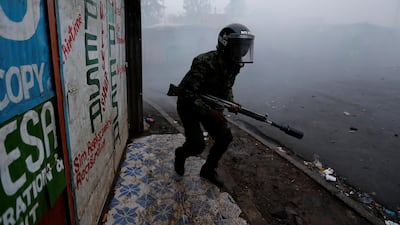At least three people were shot dead during Kenya's presidential re-run on Thursday as opposition protests sparked violence.
One man was killed in Nairobi's Mathare slum, one of the areas where protesters tried to block the vote which has been boycotted by opposition leader Raila Odinga, prompting clashes with police.
Police said another person was killed in western Homa Bay when "a large mob attacked a small police facility … and the few police officers were constrained to use live fire to protect themselves and the armoury".
Earlier police and hospital sources confirmed a 19-year-old was killed in the western city of Kisumu.
The latest casualties take the death toll since a disputed August 8 election to at least 43. Rights groups say most people were killed at the hands of police.
The election is being held again after Kenya's supreme court overturned the August vote won by president Uhuru Kenyatta, citing "irregularities" and mismanagement by poll officials. However, Mr Odinga has refused to take part in the re-run until changes are made to the election commission.
The election is being closely watched across East Africa, which relies on Kenya as a trade and logistics hub, and in the West where Nairobi is regarded as a bulwark against Islamist militancy in Somalia and civil conflict in South Sudan and Burundi.
Supporters of Mr Odinga took to the streets in several opposition strongholds on Thursday. In the western town of Migori, several hundred young men milled around on a main road littered with rubble and burning barricades.
The handful of polling officials who pitched up to work in Kisumu, the scene of major ethnic violence after a disputed election in 2007, cowered behind closed doors, unable to distribute any voting material.
_______________
Read more:
Kenyatta threatens to 'fix' judicial system after presidential election rerun ruling
Unrest feared after Kenya election ordered to be rerun
_______________
Such problems, already acknowledged by judges and the election commission, are likely to trigger legal challenges to the run-off and could stir longer-term instability in a country riven by deep ethnic divisions.
In Kisumu Central, constituency returning officer John Ngutai said no voting materials had been distributed and that only three of his 400 staff had turned up for work. One nervous official described his work in the city as a "suicide mission".
"We don't have any options," Mr Ngutai said as he and two presiding officers sorted thousands of ballot papers into piles, work that should have been completed the previous day.
Kisumu businessman Joshua Nyamori, 42, was one of the few voters brave enough to defy Mr Odinga's boycott call but said intimidation had put paid to his desire to cast his ballot.
"I know it's not a popular move," he said. "Residents fear reprisal from political gangs organised by politicians. This is wrong."
A decade after 1,200 people were killed over another disputed election, many Kenyans are ready for trouble although on the eve of the vote Mr Odinga backed off previous calls for protests and urged supporters to stay out of the way of police.
"We advise Kenyans who value democracy and justice to hold vigils and prayers away from polling stations, or just stay at home," he said.
Mr Odinga's National Super Alliance coalition, which has been accused of harassing polling staff in the run-up to the vote, is likely to present a lack of open polling stations as proof that the re-run, organised in less than 60 days, is bogus.
The head of the election commission said last week he could not guarantee a free and fair vote, citing interference from politicians and threats of violence against his colleagues. One election commissioner has quit and fled the country.
Mr Kenyatta, the US-educated son of Kenya's founding father, has made clear he sees the vote as legitimate. In central Nairobi, where support for the two protagonists is more mixed, early turnout was significantly down on August.
Anti-riot police were patrolling in Kibera and Mathare, two volatile Nairobi slums.
In a statement issued by the US embassy, foreign missions called for calm from all sides but acknowledged that the vote had been damaging to regional stability.
"Following this election, there must be immediate, sustained, open and transparent dialogue involving all Kenyans to resolve the deep divisions that the electoral process has exacerbated," it said.
Speaking on the eve of the vote, Mr Kenyatta assured his countrymen and Kenya's allies that order would be restored.
"I tell all our international partners that we will get through this," he said. "We cannot remain in a perpetual state of politicking."

